Bangladesh is at a crossroads as Muhammad Yunus, the Nobel Prize-winning economist known for his work in microfinance, takes on the role of interim leader following the resignation of Prime Minister Sheikh Hasina.
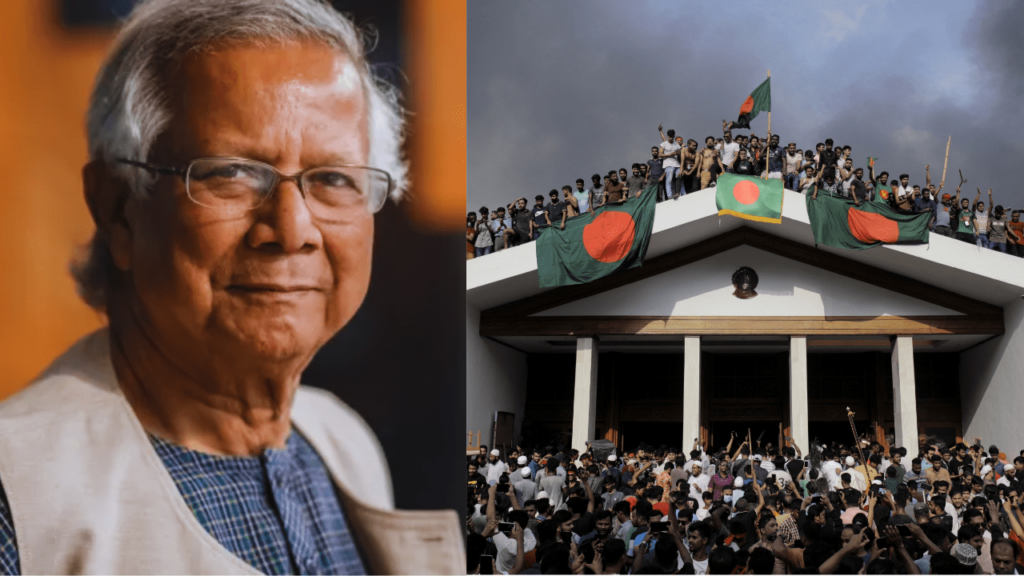
Bangladesh is witnessing a pivotal moment in its political history as Muhammad Yunus, the country’s only Nobel laureate, takes the helm of an interim government. Following the dramatic resignation and departure of Prime Minister Sheikh Hasina, Yunus has been entrusted with the daunting task of stabilizing the nation during a period of significant unrest.
The Rise of Muhammad Yunus as Chief Adviser
Muhammad Yunus, globally recognized as the “banker to the poor” for his groundbreaking work in microfinance, has been appointed as the Chief Adviser of the interim government. At 84, Yunus’s leadership is seen as a beacon of hope in a country that has been rocked by protests, political instability, and violence.
His selection for this crucial role comes directly from the very student protesters who were instrumental in bringing down Hasina’s government. These protests, initially sparked by discontent over job quotas, quickly escalated due to widespread economic difficulties and political repression, culminating in the demand for Hasina’s resignation.
The Fall of Sheikh Hasina
Sheikh Hasina, who had served as Prime Minister for four terms and was in the midst of her fifth, faced increasing opposition as the country grappled with economic hardships and allegations of political repression. The protests against her government began as a movement led by students disillusioned with the job quota system. However, the movement soon grew to encompass broader issues, including economic grievances and demands for political reform.
As the protests gained momentum, clashes with security forces became frequent, and attacks on Hasina’s allies intensified. The escalating violence and mounting pressure ultimately led to Hasina flee the country, seeking refuge in India. Her sudden departure has left a significant power vacuum in Bangladesh, and the responsibility to steer the nation through these troubled waters now rests on Yunus’s shoulders.
SUGGESTED: The Fall of Sheikh Hasina: Massive Protests and Political Unrest in Bangladesh
The Appointment of Yunus: A New Dawn for Bangladesh?
Muhammad Yunus’s appointment as the head of the interim government has been widely welcomed, not only by the protesters but also by military and government officials. His reputation as a man of integrity and his international standing have provided a level of credibility that is desperately needed during this crisis.
Prior to his appointment, Yunus was in Paris undergoing medical treatment. Despite his health concerns, he expressed a strong desire to return to Bangladesh and address the unfolding crisis. His return marks a critical juncture for the country as he prepares to lead a team of advisers in restoring stability and guiding the nation toward democratic elections.
The interim government, under Muhammad Yunus’s leadership, is expected to address the immediate concerns of the public while laying the groundwork for free and fair elections. Yunus’s vision for Bangladesh is one of peace, stability, and democracy—ideals that resonate deeply with a populace weary of political unrest.
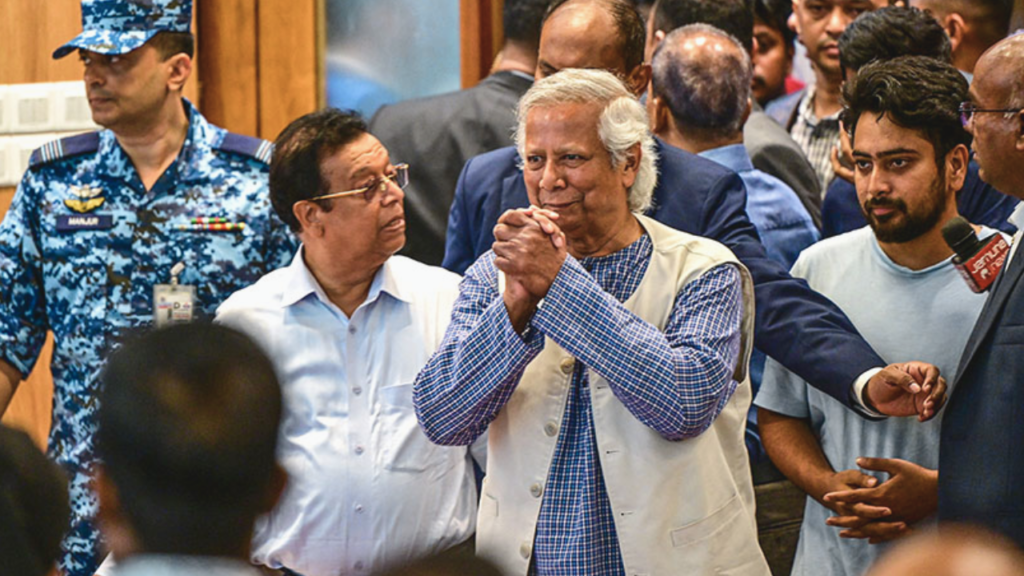
The Path Ahead: Challenges and Opportunities
While Muhammad Yunus’s appointment has brought a sense of hope, the challenges ahead are formidable. The interim government must navigate a deeply divided political landscape, restore law and order, and address the demands of the protesters, all while ensuring that the country remains on a path toward democracy.
One of the first actions taken by the interim government was the dissolution of parliament and the removal of key figures associated with the previous administration, including the police chief. These moves were seen as necessary steps to restore public confidence and demonstrate the government’s commitment to change.
In addition to political reforms, the interim government is expected to focus on addressing the economic hardships that have fueled much of the unrest. Bangladesh’s economy has been under strain, with rising inflation, unemployment, and a widening gap between the rich and the poor. Muhammad Yunus, with his background in microfinance and poverty alleviation, is uniquely positioned to address these issues, though the task will be daunting.
International Reactions and the Role of Neighbors
The international community has been closely monitoring the developments in Bangladesh. Both India and China, key regional players, have called for a peaceful resolution to the crisis. India, in particular, has a vested interest in ensuring stability in Bangladesh, given their shared history and geographic proximity.
Muhammad Yunus’s leadership has also garnered attention from global leaders, many of whom have expressed support for his efforts to bring stability to Bangladesh. His Nobel laureate status and his work in poverty alleviation have earned him respect on the international stage, which could prove advantageous as he navigates the challenges ahead.
The Road to Elections
The primary mandate of the interim government is to oversee the transition to a democratically elected government. While no date has been set for the elections, there is growing pressure from both within and outside the country for the process to be expedited. The protesters, whose demands led to the current situation, continue to call for immediate elections, reflecting the urgency felt by many in Bangladesh.
However, holding elections in the current climate poses significant risks. The interim government must ensure that the electoral process is free, fair, and inclusive, which will require substantial efforts to rebuild trust in the political system. This includes addressing the grievances of the protesters, ensuring the safety and security of voters, and preventing any interference from former political elites.
Conclusion: A New Chapter in Bangladesh’s History
The appointment of Muhammad Yunus as the head of Bangladesh’s interim government marks the beginning of a new chapter in the country’s history. His leadership offers a chance for Bangladesh to overcome its current crisis and embark on a path toward greater democracy and stability.
Muhammad Yunus’s reputation for integrity, his commitment to poverty alleviation, and his international standing make him an ideal candidate to lead Bangladesh during this critical time. However, the road ahead is fraught with challenges, and the success of the interim government will depend on its ability to navigate the complex political landscape, restore order, and lay the foundation for a democratic future.
Read Next:

The Psychology of Love: Why Valentines Day Matters More Epic Than You Think
Discover the psychology of love and why Valentines Day is more important than you think. Learn how love impacts the brain, strengthens relationships, and boosts

Premier League Highlights: Arsenal Humiliate Man City 5-1, Spurs and Palace Secure Crucial Wins
Arsenal demolished Manchester City 5-1 in a statement premier league highlights win, reigniting their title hopes. Meanwhile, Crystal Palace stunned Man United 2-0, and Tottenham

How Budget 2025 Impacts the Indian Middle-Class: Major Tax Benefits and Glaring Omissions
Budget 2025 offers major tax relief to the middle class, including zero tax on incomes up to ₹12 lakh. However, it misses out on incentives

Degrees vs Employability: Why “Highly Qualified Degree Holders” Struggle to Find Jobs While “Less Qualified Individuals” Get Hired Faster!
Many highly qualified individuals struggle to secure jobs, while less qualified candidates get hired quickly. This Degrees vs Employability paradox is caused by employer preferences,

The Power of Mindset: Why Looking Poor Doesn’t Make You Poor, but Thinking Poor Does!
Discover why looking poor doesn’t define your wealth but thinking poor does. Learn the power of mindset and how a growth-oriented mindset can lead to

Overthinking: How It’s Damaging Today’s Youth – Causes and Cure in 2025
Understanding how overthinking is silently damaging today’s youth, from its causes rooted in societal pressure and social media to its long-term effects on mental health.
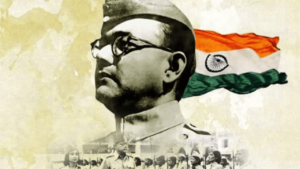
Netaji Subhash Chandra Bose: An Epitome of Epic Leadership
Discovering the incredible life of Netaji Subhash Chandra Bose, a leader whose vision, courage, and determination redefined India’s freedom struggle. Explore his leadership qualities, ideology,

Global News Headlines Today: From Gaza Ceasefire to Blue Origin’s Massive 2025 Milestone
Explore today’s top global news headlines, from the Gaza ceasefire and Blue Origin’s historic spaceflight to Apple losing its top spot in China’s smartphone market.

The Hidden Danger of Social Media Nudity: A Threat to Today’s Youth in 2025
Understanding how social media nudity is impacting the youth and their future potential. Learn about the risks of unregulated content, cultural sensitivities, and solutions for

FA Cup 2024: Manchester United Survive Arsenal Test to Advance in FA Cup Fourth Round
Manchester United defeated Arsenal in a thrilling FA Cup third-round encounter, with Atlay Bayindir’s heroics sealing the win. Read about key moments, standout performances, and

Supercopa de España: Barcelona Dominate Real Madrid 5-2 to Claim Supercup
Barcelona delivered a stunning 5-2 victory over Real Madrid in the Supercopa de España final. Read about the key moments, star players, and the significance
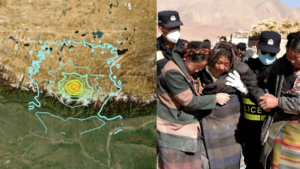
Global News Highlights Today: India’s Metro Milestone, US Aid Shift, iOS Stunning Updates and More!
Explore today’s global news highlights, including the Tibet earthquake, political tensions in South Korea, LA wildfires, US aid shifts, and India’s metro milestone. Stay informed

The Power of Keeping Plans Private in 2025: Why Silence is the Key to Achieving Your Dreams!
Discover why keeping plans private is crucial for achieving your dreams. Learn how silence boosts focus, protects momentum, and helps you achieve success without distractions

Rolls-Royce Ghost Series II Arrives in India 2025: Elegance Meets Stunning Innovation
Discover the all-new Rolls-Royce Ghost Series II launched in India, priced from ₹8.95 crore. Explore its stunning design, luxurious interior, enhanced tech features, and powerful
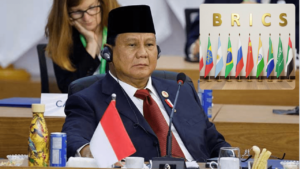
Global News Highlights: Earthquakes in Tibet, US Bird Flu Crisis Fatality, Brics Welcomes Indonesia in 2025, and Many more
Explore this week’s global news highlights, including the first bird flu death in the US, Indonesia joining Brics, devastating earthquakes in Tibet, rising HMPV cases
